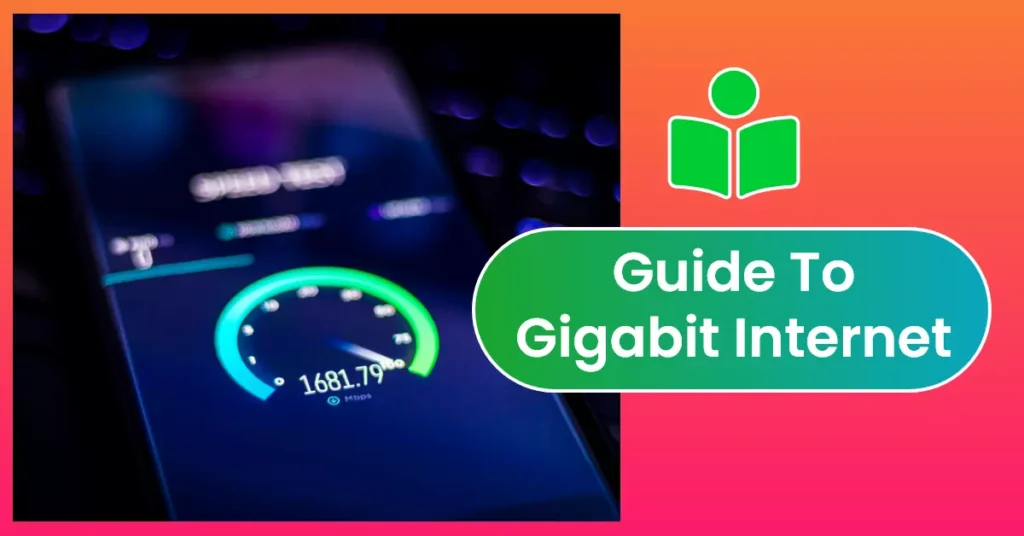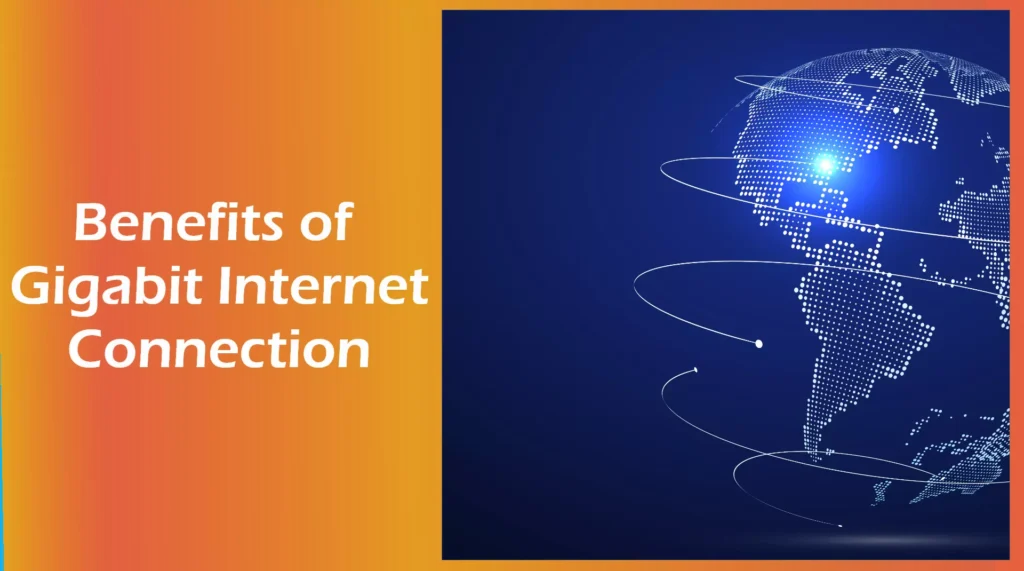A Comprehensive Guide To Gigabit Internet

With technological advancement, broadband connection, and internet connectivity, solutions are getting faster daily. Choosing the right interconnection has become confusing for residential and commercial users. You may come across Gigabit internet or Gigabit broadband when searching for an internet connection. These options may be useful because they can provide a huge average download speed. You may not know about this internet connection and have several questions before deciding.
Whether you want to know what you can get with this internet connection or want to know more about this connectivity solution, be sure to read on.
This comprehensive guide will explain what Gigabit internet is and everything you need to know about it.
What Is Gigabit Internet?
Gigabit internet is a high-speed internet connection, and as its name shows, it runs at 1 gigabit per second (1Gbps). It provides a data transfer speed of 1 Gb per second. This connection is faster than a traditional broadband connection, which typically offers 10 to 100 Mbps.
It comes in two variants known as 1GB FTTP and 1GB internet leased line. This connectivity solution has become popular in recent years due to government support. The government has launched the gigabit voucher scheme to help businesses with installation costs of high bandwidth connections.
With the help of Gigabit internet, you can make downloading and uploading data more efficient. For example, with a speed of 1Gbps, you can download a full HD movie or a computer game within minutes.
Gigabit FTTP is faster than traditional broadband and is available for general people and businesses. It is one of the best broadband connections providing high speed and is cheaper than a leased line connection. However, this connection is not available everywhere; 1Gbps speed can be achieved only through FTTP technology. So you need to look around and find Internet service providers (ISPs) offering Gigabit internet in your area.
Luckily other types of Gigabit internet are available anywhere in the UK, as leased lines can be installed anywhere in the UK. Besides the internet connection speed, several factors can impact the process, such as excess construction charges and distance from the exchange. Businesses usually choose Gigabit leased lines because of the reliability and future-proof technology.
How Does Gigabit Internet Work?
Gigabit FTTP is a full fibre connection that runs over a cable from a telephone exchange to your local fibre-enabled street cabinet. From that local cabinet, another fibre cable connects it to your premises. That is why this connection is known as fibre to the premises.
A leased line is also a full fibre connection, but the way fibre reaches you is slightly different in this connection. It comes directly from the internet service providers’ exchange point to your premises. It means there is no connection with the local street cabinet.
Businesses get confused between FTTP and leased lines, and many are using an FTTP connection and think they are on a leased line connection. It is because both connections are full fibre and go to your premises.
However, leased lines are uncontended, and FTTP is a shared connection. With a leased line, you can get better reliability and higher speed than fibre to the premises connection.
Why Do You Need Gigabit Internet Connection?

Here are some key activities where you can benefit from a Gigabit connection:
1. High Bandwidth Application
Suppose you use applications that require high bandwidth and much data to be transferred, such as augmented reality or virtual reality.
In that case, a Gigabit internet can be highly beneficial for you. It provides a faster speed than a traditional broadband connection.
2. High-Quality Video Streaming
Gigabit internet can provide enough speed to stream 4k and high-definition video content with minimal buffering.
3. HD-quality Video Conferencing
With the increase in remote work and online education, video conferencing has become very common, and everyone needs a connection that lets them connect smoothly.
Gigabit internet provides the speed that is needed for high-quality video conferencing.
4. Large File Transfers
Businesses and individuals who need to transfer large files require a high-speed connection so that this transfer can take place quickly and efficiently. So the gigabit internet can be a perfect solution for them.
5. Online Gaming
Online gaming requires a high-speed and stable internet connection. If you want to experience a seamless gaming experience without lag or delay, go for gigabit internet.
How Reliable Is A Gigabit Internet?
Gigabit Internet is one of the most reliable broadband options, thanks to its high speeds and fibre-optic and coaxial cables. Unlike older copper cables used in FTTC and ADSL broadband, which can cause performance drops, the direct-to-property cables used in gigabit internet prevent such issues.
Copper cables have limitations regarding the amount of data they can transmit, and their broadband speeds are affected by the distance from the broadband and telephone exchange. Fibre and coaxial cables, conversely, are more durable and less prone to damage and wear, ensuring better performance.
Compared to satellite broadband, 4G, and 5G broadband, direct cables have fewer problems with lag. External factors like poor weather and weak signal strength don’t impact them, resulting in a more stable connection.
Moreover, gigabit broadband offers significant download and upload speeds, making it capable of handling high-intensity usage from multiple devices simultaneously while maintaining a reliable connection for each user. It is especially beneficial for those who need to work online, as it promotes productivity.
Gigabit FTTP Vs. Gigabit Leased Line
As we have described above, Gigabit FTTP and Gigabit leased lines are slightly different. Here we are going to describe a few differences:
i. Speed
Although both are described as gigabit internet, only one is guaranteed to provide full gigabit speeds. Leased lines are uncontended and guarantee you to provide the speed you request.
Moreover, you do not need to share this connection with anyone, so you can always get a consistent speed.
Another difference is that the FTTP connection provides asymmetrical upload and download speeds. In contrast, leased lines offer symmetrical upload and download speeds.
ii. Price
The price of Gigabit FTTP starts from anywhere between £60-£100 per month, depending on the provider you choose. On the other hand, the pricing of Gigabit leased lines starts from £400-£750 per month.
However, pricing can vary depending on several factors, such as location and required excessive construction. You must shop around and compare providers to find affordable rates.
iii. Availability
As described above, FTTP is not available in all areas of the UK; even if it is available in your area, it does not ensure you can get Gigabit internet. It depends on your internet service provider and the number of subscribers.
On the other hand, you can get a leased line anywhere in the UK because it does not require any fibre cable to pass through a cabinet. Instead, it goes directly to your premises.
iv. SLA
Both Gigabit leased line, and FTTP have an SLA (service level agreement), but the difference is that the Leased Line SLAs are of business grade quality and take less time to fix an issue than the FTTP SLA.
The SLA speed of the leased line is guaranteed. If your connection speed drops below a certain level or the fixed time is not met, you will get compensation from your service provider.
v. Contention Ratio
Regarding contention, Gigabit leased line connection is better than a Gigabit FTTP connection. A leased line is an uncontended connection, meaning you do not need to share your connection with anyone else. While with Gigabit broadband, there will be multiple users on a single connection.
In other words, we can say that a leased line contention ratio is zero, but with an FTTP connection, the contention ratio will increase with the increase in the number of users on your line.
vi. Installation Time
The Gigabit FTTP connection typically takes 10 to 15 days and sometimes 30 days to install. However, time can vary depending on your service provider.
In contrast, leased lines take around 45-90 days to install. Moreover, if any problem, such as any construction or digging required, the installation time will be longer.
vii. Reliability
Since a leased line connection is solely dedicated to your business, it is more reliable than an FTTP connection. It is guaranteed that you can get a consistent speed that will not drop out even at peak usage hours.
Whereas, with FTTP, multiple businesses share a single connection, so the speed can drop when more people use the connection. If consistent and high speed is important for your business, you must go for Gigabit leased line connection.
viii. Contract Length
The contract length of a Gigabit leased line connection usually starts from 12 months, 36 months, and 60 months. In contrast, the contract length of Gigabit FTTP is typically 12 months, 18 months, or 24 months. If you choose a 12-month contract for a leased line, you have to pay installation charges that could be up to thousands of pounds.
As the demand for data continues to grow and businesses increasingly rely on cloud-based applications, there is no comparison regarding leased lines. Leased lines offer dedicated connections with guaranteed performance and reliable support designed for businesses.
While FTTP (Fibre to the Premises) can be a viable option for small businesses with limited budgets, it still falls short of providing the same level of service and reliability as a leased line.
We would recommend FTTP for home use, but a leased line is the way to go for businesses, especially those heavily dependent on their internet connection.
Is It Worth Having A Gigabit Internet Connection?
When considering having Gigabit Internet for your business or home, it is important to know the specific needs and usage habits. Suppose your business needs to transfer large data files, or you are using cloud-based applications, high-quality video conferencing, or dealing with many online customers. In that case, Gigabit Internet can improve your user experience. Similarly, if you do video streaming or play online games in your home, it is worth having Gigabit internet as it provides faster speed and stable connectivity.
Moreover, a fast and reliable internet connection is required to collaborate with team members and transfer files if you are doing remote work. Gigabit Internet will give you the speed and stability you need to be productive.
However, if you need the internet for only web browsing, checking emails, and social media, you do not need to spend money on a high-speed connection. Whether or not a Gigabit connection is worth having depends on your specific needs.
Final Words - Gigabit Internet
Gigabit internet offers speeds of 1 Gbps, which is much faster than traditional broadband. It comes in two types: Gigabit FTTP and Gigabit leased lines. While Gigabit FTTP is affordable and available for homes and businesses, its coverage is limited. On the other hand, Gigabit leased lines are more reliable and guarantee consistent speeds, making them ideal for businesses with demanding needs. Gigabit internet is great for bandwidth-intensive tasks like video streaming, conferencing, large file transfers, and online gaming. Thanks to its fibre-optic and coaxial cables, it ensures a stable connection with minimal lag. When comparing Gigabit FTTP and Gigabit leased lines, there are differences in speed, price, availability, SLA, contention ratio, installation time, reliability, and contract length. Leased lines outperform FTTP in these aspects but come at a higher cost. Ultimately, choosing Gigabit Internet depends on your specific requirements.



